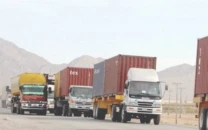Recreating the Brazilian agricultural miracle
In the 1960s, both Brazil and Pakistan began reforms that would transform their respective agricultural landscapes.

The two countries have much in common. Their populations are roughly equal, with Brazil’s 190 million slightly exceeding Pakistan’s 176 million. The majority of both populations is based in rural areas and tied to agriculture, while the climates of the two countries are also quite similar, ranging from sub-tropical to arid and semi-arid. Moreover, Pakistan and Brazil have a history of right-wing military dictatorships overthrowing populist left-wing democrats. But therein, the
similarities end.
Brazil has focused on technology and infrastructure and chose to help existing farmers boost their productivity rather than seeking to transform the political and economic landscape through so-called ‘land reforms’ and subsidies. If Pakistan is to emulate the Brazilian example, it must undertake at least four measures.
Eliminate subsidies
Perhaps one of the most important lessons of Brazil’s agricultural experience is that improvements in yields do not require subsidies. According to The Economist, the average Brazilian farmer receives only about five per cent of revenues in the form of subsidies compared with an average of 29 per cent in the European Union.
Subsidies promote a lack of competitiveness by taking away the incentive to increase productivity. This keeps wages in rural areas depressed and prevents the expansion of the Pakistani middle class. Wages only increase when productivity rises. By subsidising unproductive farms, the government essentially condemns the rural workforce to abject poverty.
But most importantly, subsidies are an inefficient use of government resources because they take money away from the one thing that can do more to improve productivity, yields and incomes: technology.
Increase funding for Parc
In 1973, the Brazilian government decided to begin phasing out agricultural subsidies and instead diverted those funds to a newly created public corporation called the Brazilian Agricultural Research Corporation, known by its Portuguese acronym, Embrapa. Pakistan, incidentally, created its equivalent organisation almost a decade earlier called the Pakistan Agricultural Research Council (Parc).
Parc has focused on many of the same things as Embrapa: breeding new strains of crops to improve efficiency and increase yields. However, because it was better funded, Embrapa was able to accomplish much more.
It invested in improving the quality of the soil via an industrial process that saw much of the hitherto uncultivable Brazilian heartland into a bread basket. More relevant from the Pakistani perspective, it began engineering farming processes to make them more efficient.
For example, Brazilian farmers use a technique known as ‘no-till’ farming. Instead of ploughing or harvesting at the ground level, the crops are cut high at the stalks and the rest of the plant left to wither away on the soil, creating a heap of organic materials that serves as a natural fertiliser, thus reducing costs.
Parc has the potential to replicate Embrapa’s success. It boasts five research centres, including one in every province and is integrated with research faculties at universities across the country.
What Parc lacks is authority and funding, two things that can easily be provided if subsidies are eliminated. Once it has enough funding, it can start promoting best practices throughout the country more effectively, increasing production quantities and incomes of the agricultural workforce.
Abandon the folly
of ‘land reforms’
A key lesson from the best-run farms around the world is that size matters. Larger farms are orders of magnitude more efficient than smaller ones. For instance, according to The Economist, the largest 30 per cent of the farms in Brazil account for 76 per cent of output.
Pakistan has pursued so-called land reforms as a social and economic experiment that was intended to uplift the rural population by providing them with their own land. It has miserably failed in achieving this goal. Rather than making land ownership the objective, focus should be on creating a rural middle class. This can only be done with large-scale productive farms employing ever-more productive employees.
Large farms can be encouraged to corporatise by reinstating the agricultural income tax for individuals and reducing it for corporations. Corporate entities can raise large amounts of capital which in turn can further improve productivity.
Line the canals
All efforts to improve agricultural productivity are meaningless without a steady water supply, the one area where Brazil’s advantage over the world is unmatched.
An overwhelming majority of canals in Pakistan are mud-lined, which means that they lose between two and five per cent of the water released into them for every kilometre. Given the length of the canal system in Pakistan, and the expected shrivelling of water resources due to climate change, lining the canals with concrete is not just a worthwhile investment – it is a necessity for survival.
This project, expected to cost billions of dollars, can be partially funded through a revenue bond: money received for water charges can go towards paying down the cost of building a better canal system.
Conclusion
Pakistan has many of the resources required to sustain and even enhance its position as one of the leading agricultural producers in the world. Given that 45 per cent of the workforce lives in rural areas, it must focus on agriculture if the country is to have a large, growing middle class. The government must adopt an integrated approach to improving agriculture for the sake of both economic progress as well as food security.
The writer is a financial and management consultant based out of Karachi
Published in The Express Tribune, September 6th, 2010.



















COMMENTS
Comments are moderated and generally will be posted if they are on-topic and not abusive.
For more information, please see our Comments FAQ